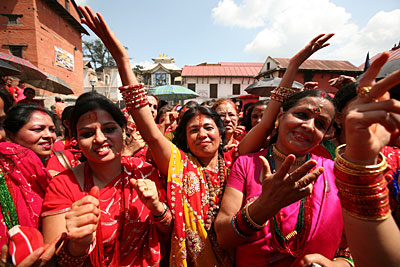 KIRAN PANDAY |
The get-together of female relatives before Tij is the Nepali women's version of football night for men. Except you don't drag your inebriated self home after the party and pass out. You attend what has now become a month-long estrogenfest, and recite the trials and tribulations of women's lives musically: the neglect by the husband, the mistreatment by the in-laws, and how they should take up the only chance to dance because the rest of the year is, well, going to be shit.
Welcome to the life of a Nepali woman, where you dance and sing your sorrows away. And there is a long list of sorrows. The maternity death rate for Nepali women ranks among the highest in the world. While the overall literacy rate has gone up, the percentage of literate women still lags behind. Almost 83 per cent of households have no property under women's ownership. Women earn about three quarters of what men earn in both agricultural and non-agricultural sectors.
Those who seek economic independence in spite of these inherent disadvantages face further harassment in the workplace. Forget the backwaters, where uneducated men and women toil in the fields: around 50 per cent of women are victims of sexual harassment in the shiny glass towers of urban areas, says the International Labour Organization. That means one out of two women in your office been physically or verbally harassed, eyed by sleazy men, or shown pornographic images.
Consider all of this part and parcel of what Nicholas Kristof and Sheryl WuDunn call the "greatest moral outrage of our century" in their new book Half the Sky. Discrimination has led to two million girls being lost every year; they are killed or aborted because, author claims they are unwanted. Another 60 to 100 million are 'missing' due to trafficking and slavery. Being a woman is tough all over the world. In Nepal, you get to sing about it.
Among the educated urban mass, the troubling aspect of this phenomenon is the failure to recognise discrimination when it happens, and the refusal to acknowledge that they can have a part in either eliminating or promoting it. During a light conversation about women's rights recetnly, a colleague pulled a disgusted face and said, "I hate feminists." Feminism is a dirty word. Those of us who risk being hated by colleagues because we want equal rights and freedom for women have to qualify it by saying we don't want to throw men off the cliff before extracting their semen so that we can populate the world with test-tube babies. There are crazies in every field, but will you stop caring for the environment because of some overzealous fruitarian eco-warriors who want you to live in a yurt in the woods?
If you question those who go around proclaiming they are not feminists and hate those that are, they will usually say that they have no problem if women want to pursue their goals in life. But to achieve the feminist utopia where there is no discrimination between the sexes requires a lot of people to change their behaviour and outlook. Only 24 per cent of men say they recognise instances of sexual harassment at work. Others seem to think that women actually enjoy being ogled.
We have the advantage that we do not live in a society where oppression is religiously or legally sanctioned. We can openly talk, or sing, about our grievances. That is the only first step. Eliminating discrimination is actually a conscious proactive process. But you can start with this: next time you say you are not a feminist, ask yourself if you would proudly go around saying you are a racist. Because saying you don't support equality between the sexes is exactly the same as saying you don't support equal rights for everyone because of their racial background.
READ ALSO:
The centre cannot hold, PUBLISHER'S NOTE
Nitty-gritty politicking, PRASHANT JHA
Meddling in the media, CK LAL
If the cap fits, ASHUTOSH TIWARI



